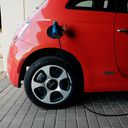Latin America's EV challenges

The enthusiasm for electric vehicles is high in parts of Latin America, but sales are lagging due to expensive options and a lack of charging stations.
Driving the news: Brazil leads the world in residents interested in purchasing EVs, according to a recent survey by Morning Consult on consumer trends in the automotive and shared mobility sectors.
- The survey of more than 16,000 adults across the Americas, Europe, and the Asia Pacific region also found Brazil leads the globe in excitement over EVs' future.
- About 47,000 EVs and hybrid electric vehicles were sold in Mexico last year, up about 61% year-over-year, the National Institute of Statistics and Geography (INEGI) found.
- And sales of EVs and hybrids skyrocketed 200% in Colombia, while similar vehicle sales jumped 231% in Chile.
Yes, but: Automakers say that, despite the demand, they don't see EVs becoming the dominant vehicle in Latin America anytime soon.
- Toyota Motor Corp. CEO Masahiro Inoue said a lack of government guidelines around decarbonizing transportation is part of the reason for the slow EV adoption in Latin America, per Bloomberg.
- For that reason and others, electric vehicles will only make up about 5% of the region’s total market by 2030, Inoue said.
The price of an electric vehicle also remains out of range for many people in Latin America, says Marcelo Mena, CEO of the Global Methane Hub and a former minister for the environment in Chile.
- "We need the market to deliver vehicles that aren't high-end," Mena tells Axios.
- The average monthly salary is $340 a month in Bogotá, Colombia, and about $428 a month in Argentina.
What to watch: Governments in Latin America should buy EV buses and urge the use of EV taxis, Mena says, which would set an example and also force government leaders to come up with a strategy for building charging station infrastructure.
- This is already being done in some places, including Chile, which is home to "the largest fleet of electric buses outside of China," Mena adds.
The big picture: According to January 2021 data from the U.S. Geological Survey, Argentina, Bolivia, and Chile possess 58% of the world’s identified lithium resources. Lithium is a key material for building EVs.
- The region’s abundance is connected to the vast salt flats where metal is extracted from brine pools through an evaporation process facilitated by the arid, sunny climate, the Americas Society / Council of the Americas said.
- Yet technology, investment, and government assistance are needed to harness lithium for economic potential, experts say.
Subscribe to Axios Latino and get more news that matters about Latinos and Latin America, delivered right to your inbox on Tuesdays and Thursdays.